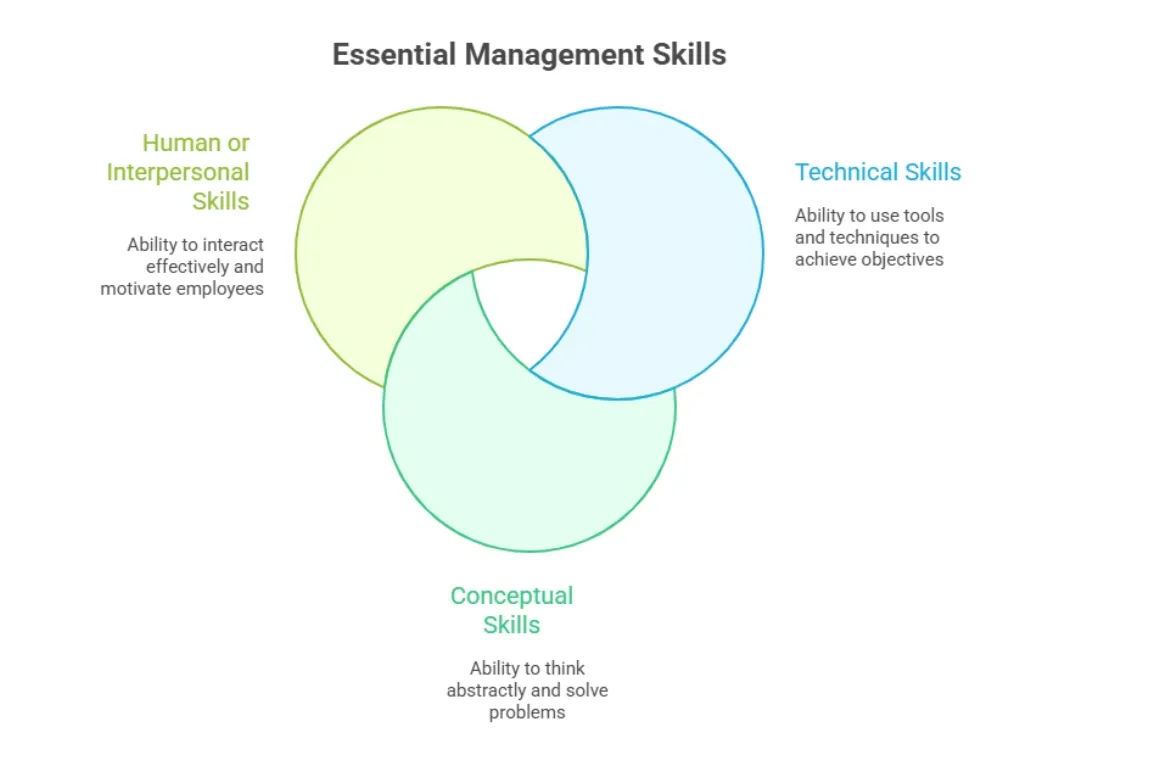Top 5 Management Skills in 2026 & How to Improve Them

In a world of rapid technological advancements and evolving employee expectations, staying ahead of the curve is not just an advantage; it's a necessity. The modern workplace demands a new kind of leader, one who is adaptable, emotionally intelligent, and a master of both digital and human connections. Take Google, for example. The company thrives by using Objectives and Key Results (OKRs) to align employee goals with its broader business objectives.
This creates a transparent system where every team member understands how their work contributes to the company's overall success. This is just one example of how top companies are rethinking management.
Many professionals find it hard to build strong management abilities, despite these clear advantages. A Deloitte study shows 75% of employees want more stability at work, but only 19% of business leaders think current business models work well. Strong management skills matter now more than ever. Ready to learn the other essential skills and, more importantly, how you can start developing them today?
Let's dive in and explore the top five management skills that will define success in 2026 and beyond.
Types of Management Skills
According to American psychologist Robert Katz, the three basic types of management skills include:
1. Technical Skills: Technical skills provide managers with the ability to use various techniques, tools and equipment to achieve objectives. This includes operating machines, software and boosting sales.
2. Conceptual Skills: These skills enable managers to think abstractly, analyse problems and find solutions. They help predict potential business challenges.
3. Human or Interpersonal Skills: These skills reflect managers' ability to interact effectively with people, utilise human potential and motivate employees.

Why do management skills matter today?
This decade has brought fundamental changes to the workplace. Management now extends far beyond traditional supervision and has become a role that requires both broad and in-depth capabilities. Today's managers act as strategic partners who must balance technical expertise with emotional intelligence to guide complex business environments.
The evolving role of managers in 2026
A manager in 2026 works in a dramatically different environment than their predecessors did. Their role extends beyond supervisory duties as they now serve as agents of strategic execution and organisational change. These professionals connect senior leadership's vision with frontline implementation, encouraging breakthroughs and leading change initiatives.
AI's integration into workplaces has redefined a manager's focus areas. While AI handles administrative tasks, successful managers dedicate their time to developing people, redesigning work processes, and enabling strategic problem-solving. This transformation requires sound judgement, knowing how to make tough decisions with limited information or unclear solutions.
Leaders must now coach teams of all types across remote and hybrid environments. This requires exceptional communication skills and cultural awareness. Successful leaders know their main value comes from realising their team's potential rather than just distributing tasks.
Why are soft skills as important as technical skills?
Soft skills have become key differentiators in modern workplaces. Technical expertise remains valuable, but human-centred abilities like communication, teamwork, and leadership have gained tremendous importance. These interpersonal capabilities create lasting competitive advantages that automation cannot easily replace as industries evolve through technological advancement.
Human elements, such as empathy and clear communication, help maintain positive team dynamics and support organisational unity. This becomes crucial in remote and hybrid work settings, where building connections requires careful planning. Soft skills provide the foundation for teams to adapt to change successfully.
Top five management skills to develop
Great managers stand out because they master specific core competencies. These skills make them more effective and help their teams succeed. Research and expert knowledge point to five essential management skills that today's leaders need.
1. Emotional intelligence
Emotional intelligence serves as the foundation of effective leadership. This skill helps managers recognise and control their emotions while understanding others' feelings. Leaders who have emotional intelligence show empathy and self-awareness. They respond thoughtfully and stay resilient. These managers think before they act, which helps them avoid snap decisions that could hurt team relationships.
Research shows that emotional intelligence directly connects to how well people perform and interact at work. Managers who score high in emotional intelligence connect well with others. This helps them build strong, supportive teams. These leaders create spaces where new ideas and creativity can flourish.
2. Effective communication
Communication means more than just speaking well it's what makes management work. The best managers excel at all types of communication: verbal, non-verbal, visual, and written. They know communication works both ways. Listening actively matters just as much as sharing ideas.
Managers spends most of their day communicating. They run meetings, give presentations, solve conflicts, and share feedback. Good communication helps work flow smoothly. It ensures resources go where needed and teams hit their targets on time.
3. Strategic thinking
Strategic thinking helps managers add real value to their organisations. They analyse information to create strategies and plans that meet company goals. Good strategic thinkers don't just react they plan ahead and shape what's coming.
The process works like a chess game. Strategic thinkers plan several moves ahead. They look at the big picture to spot challenges and grab opportunities. This forward-looking approach makes them visionaries who can guide their organisations through complex situations.
4. Decision-making
Good decisions come from spotting issues, weighing choices, and taking action. This basic skill saves time and boosts productivity. It builds trust and reduces confusion. The best decision-makers combine gut feelings with evidence and take smart risks.
Leaders must own every decision they make and accept the results. This ownership makes them stand out and gives their teams confidence in their leadership.
5. Adaptability and resilience
Problems pop up often in today's ever-changing business world. Adaptable managers find different ways to lead teams, finish tasks, and fix problems. Resilience helps them bounce back from setbacks while staying focused on their goals.
These qualities help leaders handle both immediate challenges and long-term plans. Adaptable and resilient managers guide their teams through unexpected changes calmly. They accept new ideas and keep team spirit high during changes. By seeing challenges as chances to grow, they keep moving forward even in tough times.
Also Read: 10 Essential Management Skills for Career Success
How to improve each skill in real life?
Management capabilities grow through practise and real-life application. Let me share practical ways to boost essential skills you can use daily in your professional life.
Practise active listening and empathy
Your full attention during conversations with colleagues matters most. Make eye contact, lean in, and put away your phone. After they speak, reflect their words back to confirm understanding. This builds trust and creates psychological safety in your team.
Step into your team member's shoes and think about their viewpoint without judgement. Your employees aren't robots - they have personal lives and mental health needs that deserve genuine concern and understanding.
Use data to support decisions
Raw information becomes applicable information through visual organisation. Charts, graphs, and maps make complex information available and reveal patterns. Your team members should participate in analysis to get diverse viewpoints. Ask yourself: "What did I already know about this data?" and "What new information did I learn?" These answers should shape your action plans instead of gut feelings.
Encourage team feedback and collaboration
Team members need regular chances to share ideas through surveys, one-on-one conversations, and group discussions. Great leaders welcome both positive and negative feedback as opportunities to grow. A centralised platform helps teams share knowledge across the organisation. This breaks down silos and gives everyone access to critical information.
Reflect on past challenges and outcomes
Project completion should trigger reflexion sessions. Everyone involved should share input about successes and areas needing improvement. A well-laid-out document of these "lessons learned" helps future teams. Teams avoid repeated mistakes and find ways to improve continuously.
Stay updated with industry trends
Current knowledge demands consistent effort. Industry publications, professional networks, and conferences or webinars keep you informed. New ideas become clearer when discussed with colleagues. Social media thought leaders offer cutting-edge insights regardless of location.
Common mistakes to avoid when building managerial skills
Even the most skilled professionals can hurt their effectiveness through common pitfalls. Spotting these mistakes early helps managers adjust their course before they damage team dynamics and organisational culture.
Ignoring feedback from your team: Managers often overlook valuable team insights, missing frontline knowledge that could enhance operations. Daily customer interactions give staff practical solutions that could benefit the organisation significantly.
Micromanaging instead of delegating: Micromanagement creates inefficiency. While aiming for perfection, it stifles creativity. Effective delegation enables strategic thinking and team growth through clear expectations and capable team members.
Avoiding difficult conversations: Postponing challenging discussions only worsens problems. This avoidance prevents improvement and affects team morale. Address concerns promptly with empathy.
Failing to adapt to change: Rigid management approaches hinder growth in today's dynamic environment. Without adaptability, managers struggle to guide teams through industry changes and innovations, leaving organisations vulnerable to competition.
Conclusion
Management skills are at the centre of professional success in today's fast-changing workplace. Management excellence is an ongoing experience, not a destination. These skills need constant refinement as workplace dynamics change. Notwithstanding that, managers who develop these capabilities become valuable assets to any organisation. Their teams show higher participation, better productivity, and stronger workplace satisfaction. These create powerful competitive advantages that drive organisational success.
Managing people and implementing projects on time and on budget is a business skill that all professionals should strive to master. Through sharpening your soft skills, building self-awareness, and continuing your education, you can gain the skills required to excel as a manager and lead both your team and organization to success.
Do you want to become a more effective leader and manager? Explore the business management courses offered by the top-notch management institute in India. These courses help in building management as well as leadership skills required to navigate the complexities of the contemporary business landscape.
Frequently Asked Questions
Q1. What are the top 5 management skills to develop?
The top 5 management skills to develop are emotional intelligence, effective communication, strategic thinking, decision-making, and adaptability and resilience. These skills are crucial for navigating today's complex business environments and leading teams effectively.
Q2. How can I improve my communication skills as a manager?
To improve communication skills, practise active listening, encourage team feedback, and use various communication methods effectively. Remember that communication is a two-way process, so focus on both expressing ideas clearly and understanding others' perspectives.
Q3. Why is emotional intelligence important in management?
Emotional intelligence is vital because it helps managers understand and manage their own emotions and those of their team members. This skill fosters stronger relationships, creates a supportive work environment, and enables more effective leadership.
Q4. How can I become a more adaptable manager?
To become more adaptable, stay updated with industry trends, reflect on past challenges and outcomes, and be open to new ideas. View obstacles as opportunities for growth and maintain a flexible approach to problem-solving and team management.
Q5. What common mistakes should managers avoid?
Managers should avoid ignoring feedback from their team, micromanaging instead of delegating, avoiding difficult conversations, and failing to adapt to change. Recognising and addressing these pitfalls early can prevent damage to team dynamics and organisational culture.

TalentSprint
TalentSprint is a leading deep-tech education company. It partners with esteemed academic institutions and global corporations to offer advanced learning programs in deep-tech, management, and emerging technologies. Known for its high-impact programs co-created with think tanks and experts, TalentSprint blends academic expertise with practical industry experience.



